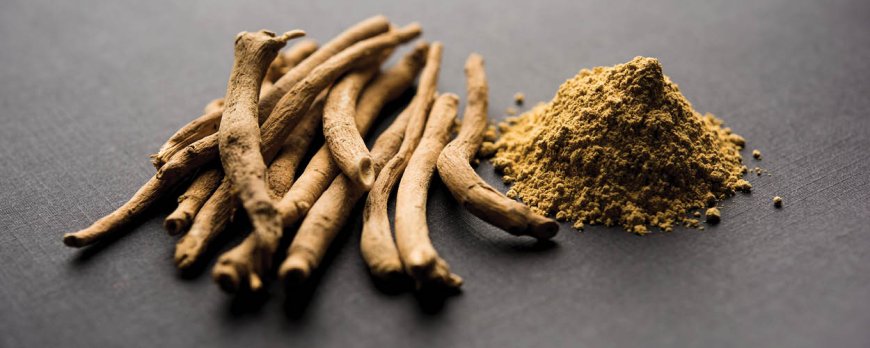Does ashwagandha have real effects?
Explore the answer to 'Does ashwagandha have real effects?' Discover its potential health benefits and insights into this potent herbal supplement.

Does Ashwagandha Have Real Effects?
Ashwagandha, an herb with a long history in Ayurvedic medicine, has gained attention for its potential effects on health and well-being. This powerful herb has been used for centuries to reduce stress and anxiety, enhance athletic performance, boost testosterone levels, reduce inflammation, and improve mental health and cognitive function. While there is promising evidence from studies suggesting these benefits, further research is needed to fully understand ashwagandha's true effects and determine the optimal dosage and forms for different conditions.
Key Takeaways:
- Ashwagandha has been used in Ayurvedic medicine for centuries and is known to have various potential health benefits.
- Studies suggest that ashwagandha may help in reducing stress and anxiety, enhancing athletic performance, boosting testosterone levels, and reducing inflammation.
- Ashwagandha shows promise in improving mental health conditions like depression and cognitive function.
- However, more research is needed to establish the best dosages and forms for different conditions and to determine ashwagandha's true effects.
- Ashwagandha should be considered as a potential natural remedy, but it is important to consult with a healthcare professional before incorporating it into your routine.

The History of Ashwagandha
Ashwagandha, also known as Withania somnifera, has been an integral part of Ayurvedic medicine for centuries. This herb, native to India and parts of Africa, has a long history of use in traditional healing practices. Ayurveda, the ancient Indian system of medicine, recognizes ashwagandha as an adaptogen, a substance that helps the body adapt to stress and promotes overall well-being.
In Ayurvedic medicine, ashwagandha is considered a rasayana, a rejuvenating herb that promotes longevity and vitality. It has been traditionally used to strengthen the immune system, improve physical and mental stamina, and promote a healthy response to stress.
Throughout history, ashwagandha has been prized for its ability to support various aspects of health and wellness. Its use dates back thousands of years, with mentions in ancient texts like the Charaka Samhita and Susruta Samhita. Today, it continues to be a popular herb in Ayurvedic medicine and is gaining recognition in Western herbal medicine as well.
The Versatility of Ashwagandha in Ayurvedic Medicine
Ashwagandha is renowned for its versatility in Ayurvedic medicine. It is believed to balance all three doshas - Vata, Pitta, and Kapha - which are the primary energetic forces in the body. This makes ashwagandha suitable for people of different constitutions and helps maintain harmony within the body.
- Stress and Anxiety: Ashwagandha is known for its calming properties and is often used to alleviate stress and anxiety.
- Athletic Performance: This herb is believed to enhance physical performance and improve endurance, making it a popular choice among athletes and fitness enthusiasts.
- Reproductive Health: Ashwagandha has traditionally been used to support reproductive health in both men and women, including boosting sperm count and enhancing libido.
Ashwagandha is available in various forms, including powders, capsules, and extracts. It can be taken as a supplement or incorporated into herbal formulations to address specific health concerns. However, it is always advisable to consult with a healthcare professional before starting any new herbal regimen.

Managing Stress and Anxiety with Ashwagandha
Ashwagandha has been shown to have potential stress-reducing properties, making it a popular choice for those seeking natural remedies to manage their daily stresses and anxieties. This herb, which is commonly used in Ayurvedic medicine, has been associated with calming effects on the body and mind.
Research suggests that ashwagandha may help regulate cortisol, a hormone released in response to stress. By reducing cortisol levels, ashwagandha can help alleviate symptoms of stress and anxiety, promoting a sense of calmness and relaxation. It may also support healthy sleep patterns, which can further contribute to overall well-being.
Additionally, ashwagandha may have adaptogenic properties, meaning it helps the body adapt to stressors and maintain balance. This can enhance resilience to stress, allowing individuals to better cope with daily challenges.
While ashwagandha shows promise in managing stress and anxiety, it is essential to note that individual experiences may vary. It is always recommended to consult with a healthcare professional before incorporating any new supplement into your routine, especially if you have underlying health conditions.
Enhancing Athletic Performance with Ashwagandha
Athletes and fitness enthusiasts have turned to ashwagandha to potentially enhance their athletic abilities and improve overall performance. This herb, widely used in Ayurvedic medicine, has shown promising effects on physical performance and recovery.
One of the key ways ashwagandha may benefit athletes is by reducing exercise-induced stress and fatigue. Studies have indicated that ashwagandha supplementation can help lower levels of the stress hormone cortisol, which can hinder performance and recovery. By reducing cortisol levels, ashwagandha may support better endurance, strength, and overall athletic performance.
Additionally, ashwagandha has been found to increase muscle strength and mass. It may promote muscle protein synthesis, offering potential benefits for athletes looking to build or maintain muscle. This makes it an appealing supplement for individuals involved in strength training and other high-intensity activities.
Furthermore, ashwagandha's anti-inflammatory properties may aid in exercise recovery. Intense physical activity can lead to inflammation in the body, which can impact performance and delay recovery. Preliminary research suggests that ashwagandha may help reduce exercise-induced muscle damage and inflammation, enabling athletes to bounce back faster and train more effectively.
Summary:
- Ashwagandha is commonly used by athletes and fitness enthusiasts to potentially improve performance.
- It may reduce exercise-induced stress and fatigue by lowering cortisol levels.
- Ashwagandha could enhance muscle strength and promote muscle protein synthesis.
- It possesses anti-inflammatory properties that may aid in exercise recovery by reducing muscle damage and inflammation.

Boosting Testosterone Levels with Ashwagandha
Ashwagandha has shown promise in supporting healthy testosterone levels, making it a sought-after supplement for men seeking to optimize their hormonal balance. This ancient herb has been used in Ayurvedic medicine for centuries and is known for its numerous health benefits. Here are some key points to consider:
- A natural approach: Ashwagandha offers a natural alternative for men looking to enhance their testosterone levels. By incorporating this herb into their wellness routine, individuals can potentially experience an improvement in overall hormonal health.
- Potential benefits: Studies have indicated that ashwagandha may help increase testosterone levels in men. Improved testosterone levels can contribute to increased muscle mass, energy levels, and a healthy libido.
- Reduced stress: One of the primary reasons for the potential testosterone-boosting effects of ashwagandha is its ability to reduce stress. Chronic stress can negatively impact testosterone production, and ashwagandha's adaptogenic properties may help regulate cortisol levels, leading to better hormonal balance.
Navigating dosage and forms
While ashwagandha shows promise in supporting healthy testosterone levels, it's important to consider the optimal dosage and forms for different individuals and conditions. Consulting with a healthcare professional or herbalist experienced in Ayurvedic medicine can provide valuable guidance on the appropriate dosage and form suitable for individual needs.
In conclusion, ashwagandha has the potential to boost testosterone levels and improve hormonal balance in men. However, further research is necessary to fully understand the extent of its effects and identify the most effective dosages and forms. Incorporating ashwagandha into a well-rounded wellness routine may help individuals seeking to optimize their hormonal health, but it's essential to consult professionals for personalized advice.
Reducing Inflammation with Ashwagandha
Inflammation has been linked to various chronic conditions, and ashwagandha may offer a natural way to potentially alleviate inflammation and promote overall well-being. This ancient herb has been used in Ayurvedic medicine for centuries and is known for its potential anti-inflammatory properties.
Studies have suggested that ashwagandha may help in reducing inflammation in the body. It contains compounds like withanolides, which have been found to possess anti-inflammatory effects. These compounds may inhibit the production of pro-inflammatory molecules and modulate the activity of immune cells involved in the inflammatory response.
- Reduced Joint Inflammation: Ashwagandha has been studied for its potential effects on inflammatory conditions like arthritis. Some research indicates that it may help reduce joint inflammation and improve symptoms in individuals with arthritis. However, more studies are needed to further establish its efficacy.
- Potential Cardiovascular Benefits: Chronic inflammation is a known risk factor for cardiovascular diseases. Preliminary studies suggest that ashwagandha may help lower markers of inflammation in the body, such as C-reactive protein (CRP) levels. These findings indicate that ashwagandha may have potential cardiovascular benefits by reducing inflammation.
While these studies show promising results, it is important to note that further research is needed to better understand the mechanisms and optimal dosage of ashwagandha for reducing inflammation. Additionally, individual responses to ashwagandha may vary, and it is always recommended to consult with a healthcare professional before incorporating any new supplements or herbs into your routine.
Summary
Ashwagandha, an herb with a long history in Ayurvedic medicine, may offer potential anti-inflammatory benefits. Studies suggest that it may help reduce joint inflammation and lower markers of inflammation in the body. However, more research is needed to determine the exact mechanisms and dosage for optimal results. As with any supplement, it is advisable to consult with a healthcare professional before use.
Mental Health and Cognitive Benefits of Ashwagandha
Emerging research suggests that ashwagandha may hold promise in supporting mental health, enhancing cognitive function, and improving sleep patterns. This ancient herb has shown potential in reducing symptoms of depression, anxiety, and stress, making it an intriguing natural option for those seeking alternative treatments.
1. Depression
Ashwagandha's adaptogenic properties may help regulate cortisol levels, the stress hormone associated with depression. By modulating stress responses, ashwagandha could potentially alleviate symptoms of depression and improve overall mood.
2. Cognitive Function
Preliminary studies indicate that ashwagandha may have positive effects on cognitive function, memory, and attention. Its neuroprotective properties, along with its ability to reduce oxidative stress and inflammation, could contribute to improved brain health and cognitive performance.
3. Sleep Quality
Another potential benefit of ashwagandha is its ability to promote better sleep. Chronic stress and anxiety can disrupt sleep patterns, leading to insomnia and poor sleep quality. Ashwagandha's calming properties may help individuals achieve a more restful sleep, enhancing overall well-being.
While these initial findings are promising, it is important to note that more rigorous research is needed to establish ashwagandha's true effects on mental health and cognitive function. Additionally, optimal dosage and forms of ashwagandha for specific conditions still need to be determined. Nonetheless, as interest in natural remedies continues to grow, ashwagandha shows potential as a complementary option for those seeking holistic approaches to mental well-being.
The Need for Further Research
While promising, the current body of research on ashwagandha acknowledges the need for further studies to definitively establish its real effects. Although there have been several studies examining the potential benefits of ashwagandha, many of them have limitations such as small sample sizes or lack of placebo control groups.
To fully understand the true effects of ashwagandha, more robust and rigorous studies are required. These studies should include larger sample sizes, longer duration, and rigorous methodology. Additionally, more research is needed to determine the optimal dosage and forms of ashwagandha for different conditions.
Potential research areas could include:
- Long-term effects of ashwagandha on stress reduction and anxiety management.
- Effectiveness of ashwagandha in improving athletic performance in various sports and activities.
- Optimal dosages and forms of ashwagandha for boosting testosterone levels in different populations.
- Exploration of the anti-inflammatory properties of ashwagandha and its potential in managing chronic inflammatory conditions.
- Further investigation into the effects of ashwagandha on mental health, such as its impact on different types of depression and cognitive function.
By conducting more comprehensive studies in these areas, researchers can gain a deeper understanding of ashwagandha's true effects and potential benefits. This would also help healthcare professionals provide evidence-based recommendations to individuals seeking to incorporate ashwagandha into their wellbeing routines.
Conclusion
Ashwagandha, an herb steeped in traditional Ayurvedic medicine, holds potential for various health benefits, yet further research is necessary to fully understand its real effects. This ancient herb has garnered attention for its ability to reduce stress and anxiety, enhance athletic performance, boost testosterone levels, and reduce inflammation in the body.
Studies have also suggested that ashwagandha may have positive effects on mental health conditions like depression, as well as cognitive function and sleep quality. However, it is important to note that while these initial findings are promising, more robust research is needed to definitively establish the true benefits of ashwagandha.
As scientists continue to explore the potential of ashwagandha, it is crucial to determine optimal dosages and forms for different conditions. This will help healthcare professionals and individuals make informed decisions about incorporating ashwagandha into their wellness routines. By conducting comprehensive studies, we can gain a deeper understanding of the herb's mechanisms and efficacy, ensuring that its potential benefits are fully realized.
In conclusion, while ashwagandha shows promise as a natural remedy, further research is required to conclusively establish its real effects and assess its potential benefits. With ongoing scientific exploration, ashwagandha may offer a valuable addition to our arsenal of wellness tools, providing individuals with an alternative approach to improving their overall health and well-being.

































































































































